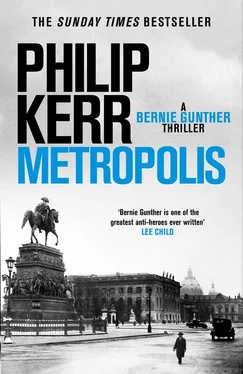I held my breath and waited patiently while Mendel peered through his comparison microscope again. After a while he started to smile.
‘Yes. In my opinion these two bullets match perfectly. Obviously the killer has used more than one weapon. But this is one of them. Without a shadow of a doubt. Take a look for yourself.’
I peered through the eyepiece. To my untrained, inexpert and tired eye, the mangled bullets looked, at best, not dissimilar.
‘You’re sure these were fired from the same gun?’
‘I’m certain of it.’
The Browning .25 Reichenbach had so coolly lent me was a murder weapon .
‘Well, I must say, you don’t look very pleased, Gunther. Surely this is a major step to solving the case.’
I was thinking of the scandal that was about to engulf the Alex, a scandal that might very well end up costing Bernhard Weiss his job. The right-wing newspapers were just looking for an excuse to go after him again, and this time even he wouldn’t be able to sue. What could have looked more incriminating for the Jewish deputy police commissioner than a multiple murderer who was a Jewish detective in Kripo? They would hang him out to dry. But who was going to believe me anyway? Not Ernst Gennat. He probably still thought I was a drunk. And it was Kurt Reichenbach’s word against mine that he had ever owned the Browning. What I needed was more evidence. But what kind of evidence? And how to get it?
‘I’m grateful, Mendel. Don’t think I’m not. But while I may have the gun I don’t yet have the man who owns it in custody. So I’d be very grateful if you didn’t mention this to anyone for now.’
‘Sure. No problem.’
‘That Browning you said you own. Have you got it on you?’
‘Of course.’
‘Would you lend it to me?’
‘Sure. But why?’
‘Let me see it.’
Mendel fetched the little jet-black automatic from his jacket pocket and handed it to me. I examined it carefully. It looked identical to the pistol I’d brought with me.
‘The murder weapon. I can’t take it with me. Not now you’ve proved that’s what it is. But I need to return a Browning pistol to the man I borrowed it from. Even if it’s a different one.’
‘Sounds dangerous.’
‘So wish me luck.’
‘Mazel tov.’
I went upstairs to look for Reichenbach. He wasn’t there. But one of his colleagues in Kripo was and told me he hadn’t been seen all day.
‘But that’s not unusual.’
‘Anything to do with a lead I gave him? About the mob killing outside Aschinger. He said he was going to check it out.’
The detective, a sergeant named Artner, shook his head.
‘He hasn’t mentioned it.’
Kurt Reichenbach lived in an apartment on the top floor of a smart building in Halensee, at the west end of Kurfürstendamm, where Berlin turns very green. There were some lights on in the windows, and his car — the new Brennabor — was parked on the street outside. I rang the doorbell, ready to give him a story about how I was just passing and saw the car, and then the lights on in the apartment and had thought to quickly return his gun. I also had ready a follow-up story to the effect that I appreciated his offer of watching my back and how I wondered if he was prepared to keep an eye on me when I posed as a klutz again the following day. I’m not sure what I was expecting to find out, maybe I just wanted to look him in the eye. I certainly didn’t think a full confession was on the cards, but I did nurse a vain hope that somehow I might come away from his apartment with some of my suspicions allayed. After a minute or so I heard a window open upstairs and a woman, presumably Reichenbach’s wife, Traudl, called down to me.
‘Yes. Who’s there?’
‘Police. Bernhard Gunther, from the Alex.’
‘Oh. Has something happened to Kurt?’
‘No. Not that I know of. I was hoping to find him at home.’
‘He’s not here. Wait. I’ll throw some keys down. Top floor. Number ten.’
I found the keys and let myself in the front door. I took the stairs instead of the lift, only because it gave me time to adjust my story. If I was going to speak to his wife, then there might be a way to get some information out of her without raising the woman’s suspicions; at the same time I was thinking that if his car was there and he wasn’t at home or at the Alex, then where the hell was he?
Traudl Reichenbach opened the door to the apartment wearing a nurse’s uniform and a look of deep concern. I showed her my warrant disc just to reassure her that I was on the level.
‘Are you sure there’s nothing the matter?’ she asked, ushering me inside. ‘Only Kurt didn’t come home last night. That’s not so very out of the ordinary, him being a detective, but he usually manages to let me know. So this is not like him. Plus his car is still here. Hasn’t moved since yesterday.’
‘Are you sure?’
‘It’s not like there are many other cars in the street.’
‘I see. No, I was in the area and thought I’d drop in and ask him if he wanted to come out for a drink. I have a favour to ask him.’
‘Would you like to wait for him? Perhaps you’d like some coffee, Herr Gunther?’
She smelled, lightly, of sweat, as if she’d just come from work, but was no less attractive for that: a tall, fair-haired woman with brown eyes, wide hips and strong, defensively folded arms.
From what I could see of it, the apartment’s interior was modern with the kind of expensive furniture you only see in magazines. We stayed in the entrance hall, which was patrolled by a black cat and smelled lightly of cinnamon, as if she’d been baking. The cat wrapped its tail around my leg, prompting her to shoo it away impatiently.
‘No, thanks,’ I said. But a minute later I spotted a typewriter on the dining table and regretted turning down the coffee. It was an Orga Privat Bingwerke. I wondered if it was going to be possible for me to check to see if the machine displayed a horizontal alignment defect in which the capital letter G printed to the right, which would have certainly proved that it was Reichenbach who’d sent the letters to the newspapers. But it was clear that an examination of the machine would probably have to wait until later. The same way I was going to have to wait to try to match Reichenbach’s handprint to the one we’d found in the wet paint of the door to the Patent Office on Alte Jakobstrasse.
‘I’m worried,’ she confessed. ‘This isn’t like Kurt at all. He knows I worry enough about him as it is.’
‘All coppers’ wives worry. It’s natural.’
‘Maybe. But he suffers from extreme melancholy, you see. Has done ever since the war. Sometimes he’s suicidal.’
I shrugged. ‘I’m that way myself sometimes, Frau Reichenbach. There’s hardly a man who came out of the trenches who isn’t scarred in some way. Only, sometimes those scars aren’t obvious.’
‘I suppose so.’
I glanced through another door at an impressively equipped kitchen, where a second black cat stared back at me with unblinking green eyes as if, like a cynical lawyer, it knew what I was up to.
‘But look, maybe I can help. Maybe he left something in the car that will help tell us where he is. Would you like me to go and have a look, Frau Reichenbach? It’s the grey Brennabor, right?’
She fetched the key from a hook on the kitchen wall and handed it over and I told her I wouldn’t be long.
I went back downstairs and unlocked the car. There was nothing in the front or rear seat, so I went around the back and opened the enormous boot. There was a torch and I picked it up, turned it on, and lifted an old army-style woollen blanket. Underneath a surprise awaited me, and not a pleasant one: There, on the floor of the boot, I found a heavy hammer, a razor-sharp knife and a fedora hat to which a bit of yellow wig was attached on one side; there was also a loden coat with a smudge of green paint on the sleeve. And looking at these four objects it was immediately plain that Reichenbach was Winnetou. The only thing missing was a motive explaining why he had murdered all those people. Because it made no sense to me. Frau Reichenbach seemed like a nice woman; it was hard to imagine how a man married to her could have brutally murdered four prostitutes. The anticlimax of my discovery was only exceeded by the terrible disappointment of being proved right; I thought of some of the other policemen I’d have preferred the killer to have been and realized I had little or no appetite for arresting a brother officer I liked and admired.
Читать дальше












